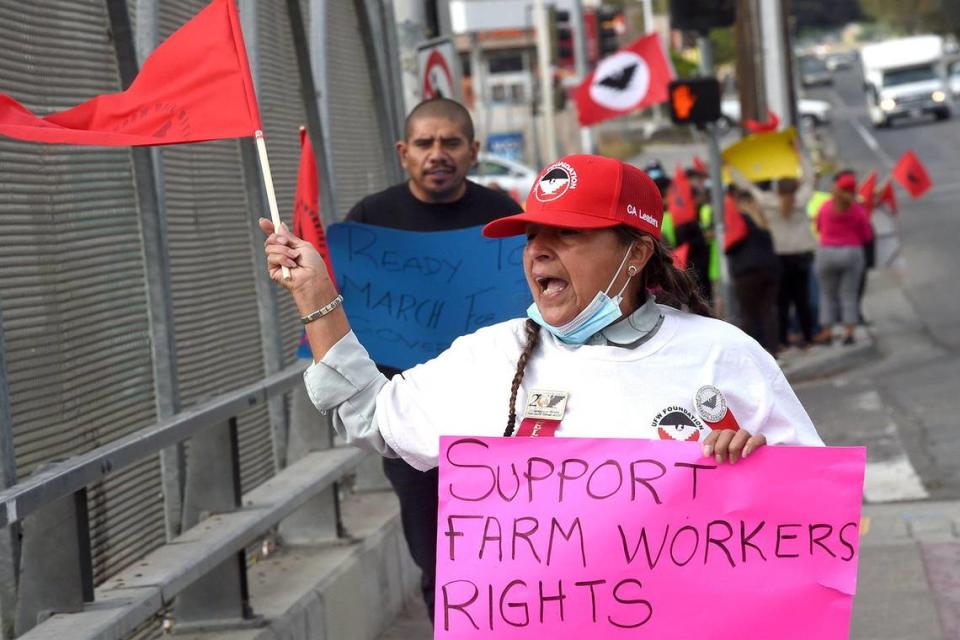An undocumented farmworker decided to march for a month without pay. Here’s her reason
With cramped legs, blistered feet and a face flushed by the sun, Lourdes “Lulu” Cárdenas caught her breath in the shade, surrounded by supporters of the United Farm Workers.
The 59-year-old undocumented campesina, or farmworker, had just finished a 19-mile walk from Parlier to Calwa Park in Fresno County last Thursday, as part of a 24-day march organized by the UFW.
Hundreds of protesters have been marching since Aug. 3 to pressure California Gov. Gavin Newsom to sign AB 2183, which supporters say could make it easier for farmworkers to vote in union elections and ultimately join collective bargaining contracts in California. The UFW’s “March for the Governor’s Signature,” a 335-mile journey that began in Delano, is expected to end next Friday in Sacramento.
Cárdenas said she is not receiving any type of subsidy, reimbursement or payment to participate in the march.
“I was working in the peach harvest, but decided to stop working because this fight is worth more than the job,” Cárdenas said in Spanish. “That money isn’t going to increase sick days or benefits. I prefer to stop working to gain what we deserve: benefits, respect, equality.”
Cárdenas said she works with both unionized and non-unionized field crews and she is marching for the rights of her community.
“If we don’t come together, we can’t accomplish anything and they will be richer and us poorer, sicker and older,” Cárdenas said.
Many members of the agricultural industry, meanwhile, oppose AB2183.
In an online campaign against the bill, the California Farm Bureau’s political advocacy group, Farm Team, said the legislation would “strip California farm employees of the right to a secret ballot election supervised by the Agricultural Labor Relations Board.”
“Union advocates want to water down the protections of the Agricultural Labor Relations Act by allowing union agents to hide behind a claim that AB 2183 creates ‘mail-in balloting’ for union elections when in fact union agents will fill in the ballots, pressure employees to sign them, collect them and send them to the ALRB,” the advocacy group said.
Farmworker joins UFW march
Cárdenas is from the Mexican state of Sinaloa and previously worked in maquiladoras — low-cost factories in Mexico owned by foreign companies — in the city of Culiacán. She migrated to Fresno 20 years ago, seeking job stability and better pay.
However, life in the Valley didn’t offer her many options.
“The fields are the only place you can go in (to work) as an undocumented person,” Cárdenas said. “I don’t have papers and that’s where we all start because we can’t find a better paying job because of our status.”

Fifteen years ago, she joined a unionized field crew at Papagni Wines in Madera, harvesting wine grapes, and became her union’s secretary general.
That job lasts just three months, so during the other nine months of the year, she works without union protections. She said she has experienced first-hand what it’s like to work without those protections.
“Here in the fields, there is a lot of abuse, wage theft, bad treatment and violations,” Cárdenas said. “There are a lot of abuses.”
La Abeja, a newsletter written for and by California Latinos
Sign up here to receive our weekly newsletter centered around Latino issues in California.
Cárdenas said she’s not discouraged by those challenges. Rather, she said, they motivate her to continue fighting for farmworkers’ rights.
Still, she does not want any of her seven grandchildren to work in the fields, she said.
“I prefer for them to get educated and prepared to get better jobs,” she said.
California worker marches miles every day
Andres Chavez, Cesar Chavez’s 28-year-old grandson and executive director of the National Chavez Center, said he admires Cárdenas’ “strength and resiliency” and how she motivates other marchers to continue on their journey to Sacramento.
“Every time I see her on the march, no matter if it is at mile one or like yesterday at mile 19, she has a smile on her face and she’s really carrying the pace of the march,” Chavez said last Friday, as he walked with the marchers from Calwa to the Fresno County community of Biola.

Eriberto Fernandez, the government affairs deputy director with UFW Foundation, also praised Cárdenas. He described her as “fierce through and through.”
“Lourdes is an exemplary career farmworker, and I’m very proud to be marching alongside her,” Fernandez said.
Last Thursday’s march ended at Calwa Park, where supporters cheered on the protesters as they walked toward a cluster of picnic tables covered with bottles of water and electrolyte drinks. Volunteers also gave marchers, food, Neosporin and clean socks.
Thankful and with new supplies to treat her blisters, Cárdenas said she was ready to face the next day’s 19-mile walk.
“Sí se puede,” she said.

